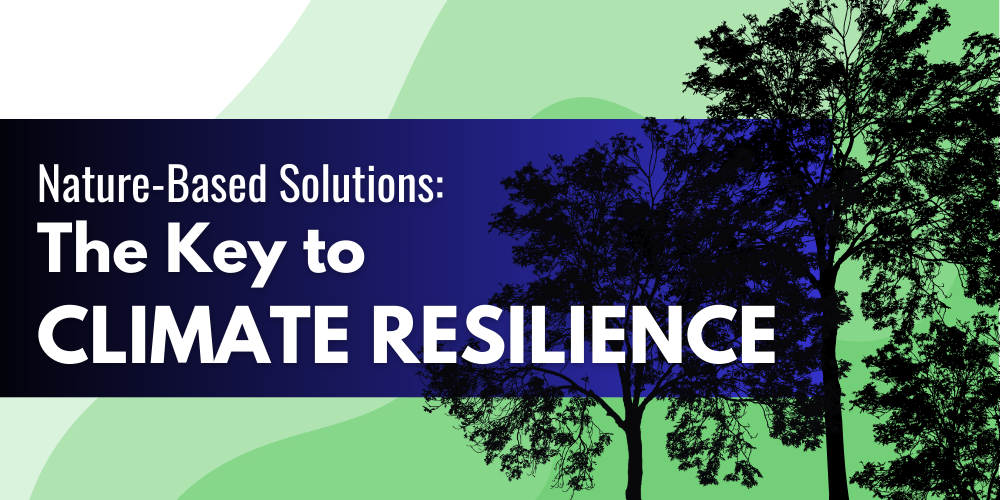Nature-Based Solutions: The Key to Climate Resilience

Scientists, researchers, entrepreneurs, and advocates have identified many strategies to combat climate change and increase community resilience, from behavior change campaigns to pollution mitigation and sequestration technologies. Yet, despite our scientific and technological advances, it turns out Mother Nature knows best when it comes to balancing our climate. Nature-based Climate Solutions (NbCS) are practices quickly gaining traction worldwide that leverage natural ecosystems’ abilities to combat and adapt to climate change. By supporting and utilizing nature’s own processes, we can more swiftly and effectively address the climate crisis, benefitting both people and the environment.
What are nature-based climate solutions?
Although it is a rapidly growing field, nature-based climate solutions are not a new idea. Rather, this movement is a modern embrace of Traditional Ecological Knowledge (TEK) practices and principles, which have been active and passed down by Indigenous peoples for millennia, and NbCS efforts worldwide are frequently led by Indigenous leaders.
Amidst the extensive damage caused by the climate crisis, the good news is that nature already has the ability to reduce pollution, stabilize temperatures, and support ecosystems. We just need to re-learn how to restore these natural processes. Research shows that NbCS offer a wide range of interconnected benefits, helping to restore our ecosystems and their ability to regulate climate and enhance the overall health of our environment.
How do nature-based climate solutions build climate and community resilience?
Healthy ecosystems—complex, diverse networks of plant and animal life—naturally capture and store atmospheric carbon dioxide, the main driver of global climate change. Estimates suggest that by restoring healthy ecosystems and their natural processes, NbCS can boost progress in tackling climate change by up to 30%.
Strong ecosystems are also important players in lessening the negative impacts of climate change on human communities. They act as buffers to storms and flooding, prevent erosion, and provide cooler temperatures. Nature-based climate solutions help us mitigate and adapt to climate change and protect human health and safety.
Does this sound familiar?
You might remember the concept of NbCS from following Eco-Cycle’s Carbon Farming efforts. Carbon farming involves implementing regenerative farming practices such as “no tillage,” cover crops, grazing, and adding amendments such as compost that restore living ecosystems and increase soils’ ability to draw down atmospheric carbon and store it safely in the ground for the long term. Eco-Cycle has been piloting and implementing carbon farming solutions since 2019, from farms across the county to your own backyard!
A Local Nature-Based Climate Solution: The Cool Boulder Campaign
The Cool Boulder Campaign is a collaborative effort involving the City of Boulder, local organizations, and communities to tackle the climate crisis and biodiversity loss through nature-based actions. The campaign focuses on three areas: expanding our urban connected tree canopy, planting biodiverse habitats in urban areas to create pollinator pathways for key native species, and creating absorbent landscapes by rebuilding the health of our soils to capture and hold more carbon, water, and nutrients. Cool Boulder acts as a bridge between emerging, nature-based climate science and engaged community members, and works with researchers to develop and implement a larger vision for resilience goals in the community and plan for future climate conditions.
Eco-Cycle is a leading organization of Cool Boulder’s campaign as a next step in our NbS efforts. From 2019–2021, Eco-Cycle conducted an NbCS campaign: the Community Carbon Farming Project. Working with more than 250 community members, we employed NbCS by applying soil amendments like compost to lawns and gardens to help sequester carbon from the atmosphere. Now we’re building on that work and taking the next step. In partnership with Cool Boulder, we’re creating a Neighborhood Urban Forest!
What’s a Neighborhood Urban Forest?
To prepare for climatic extremes and proactively build resilience and urban biodiversity, the City of Boulder’s goal is to build a connected canopy of thousands of trees and shrubs planted in our community—most of which will need to be located on private land, like your yard! Eco-Cycle is looking for resident volunteers to help make this vision of climate resilience come to fruition.
How can you get involved?
The Fairview, BCSIS, and Crestview neighborhoods have been selected by Cool Boulder to launch the new Neighborhood Urban Forest Pilot Program this fall. We’re looking for neighbors in those areas to adopt and plant a FREE tree or shrub provided by the City of Boulder! Participants will receive regular care support and communication from our tree expert partner PLAY Boulder Foundation Tree Trust. After you fill out the interest form, you’ll receive information about where to plant your tree or shrub, species options, and more. You will be supported throughout the process by Eco-Cycle, PLAY Boulder, and Cool Boulder partners.
If you don’t live in a pilot neighborhood or can’t currently plant a tree or shrub, you can still sign up to be a volunteer to support the project through the form linked below. You can also follow along with the Cool Boulder by subscribing to the Cool Boulder newsletter.



























